Following up on forest protection: Wilmar*
One of the most effective and cost-effective ways to fight climate change is to stop deforestation, a leading contributor to greenhouse gas emissions. That is why Green Century is working to protect tropical forests by moving companies to adopt and implement zero deforestation policies that seek to decouple corporate supply chains from deforestation.
In the last four years, Green Century has worked with over 15 companies to secure sustainable sourcing policies for forest commodities like palm oil, the most widely used vegetable oil in the world.
These policies benefit the endangered species and local and indigenous communities that depend on these forested areas, improve worker conditions, and protect the environment through decreasing carbon emissions and preserving water quality, while safeguarding companies from risk and potentially positioning them to enjoy competitive advantages.
Consumer facing companies that you might find in the Green Century Funds, like Starbucks* and Kellogg’s,* source the majority of their palm oil from growers and traders in Indonesia and Malaysia, where 85% of the world’s palm oil comes from.
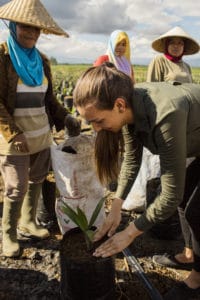
Shareholder Advocate Kate Kroll with Wilmar workers planting young palm trees in Sumatra.
Through our seat on the United Nations Principles on Responsible Investment (UN PRI) advisory board on palm oil, we have worked with nearly all levels of the palm value chain, from end users to the suppliers themselves.One of the most transformational zero deforestation commitments Green Century pressed for is from Wilmar International Limited,* the largest palm oil processor in the world, Asia’s leading agribusiness, and an employer of 92,000 people globally. The company’s zero deforestation commitment, which was the first from a major processing company to cover all their third-party suppliers as well as their own managed lands, inspired many others in the industry to make similar commitments. This collective commitment is estimated to have helped prevent deforestation of 6.1 million hectares of land in Indonesia,1 which is more than twice the size of Belgium.

But we know that adopting a policy is just the first step and that implementation is critical. Green Century’s award winning shareholder advocacy program does more than just engage with companies on a surface level, we seek to drive real impact on the ground. That is why our shareholder advocate, Kate Kroll, went back to Indonesia last month to make sure the groundbreaking commitments we helped secure are being implemented.
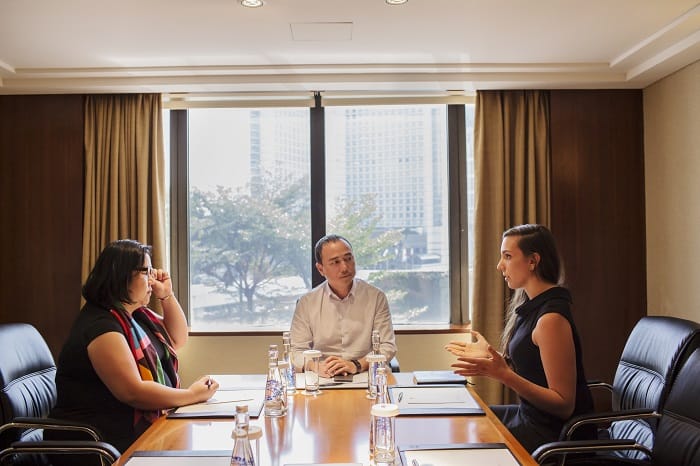
Green Century’s Kate Kroll with Jeremy Goon, Wilmar’s Chief Sustainability officer, and Perpetua George, Assistant Sustainability Manager, in Jakarta.
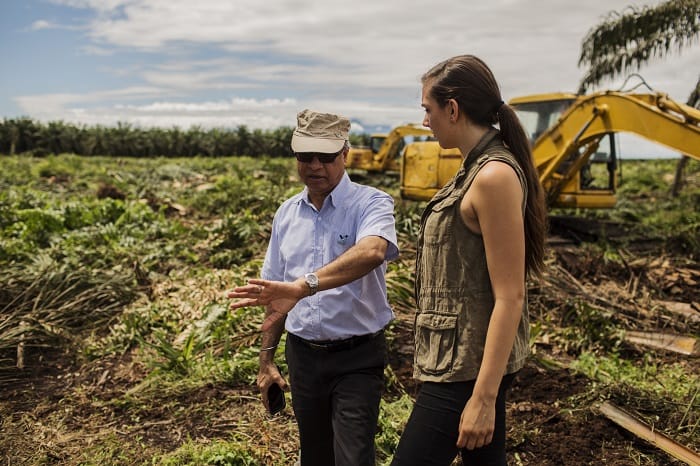
Kate Kroll with Wilmar’s Plantation Manager learning about the practices the company adopted to replace burning.
In Jakarta, Kate met with Jeremy Goon, Wilmar’s Chief Sustainability Officer, to learn more about how the company is making a difference for the environment, the communities it operates in, and for its investors.Because of Wilmar’s direct influence on tropical forests and its scale of business, complete palm industry change cannot happen without effective implementation of the company’s commitment. Through conversations with company representatives in both meeting rooms in Indonesia’s capital of Jakarta and on site on the plantations of Sumatra where Wilmar’s policy comes to life, Kate provided investor accountability and received valuable information on the difference a leader’s commitment can make.
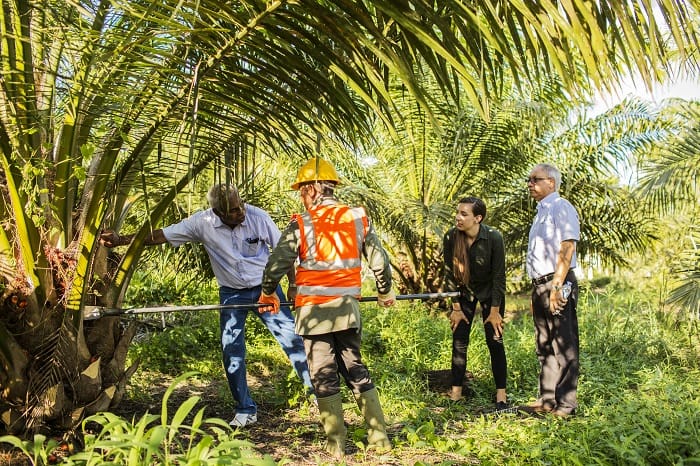
Kate touring one of Wilmar’s palm plantations in Sumatra.
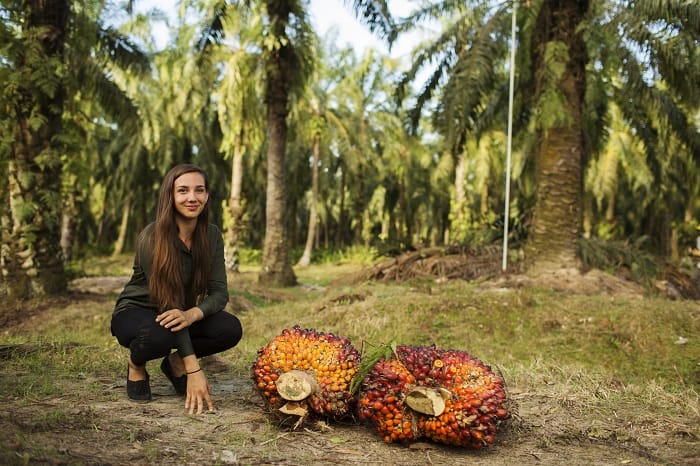
Kate with two fresh palm fruit bunches taken from the trees behind her.
Wilmar’s progress towards deforestation-free palm oil is an example both to other growers and consumers that change is possible, and an example of the impact that investors can make through Green Century.
Sign up here to stay up to date on all our work to protect forests and to learn more about how your investments are making an impact.
1Chain Reaction Research, 2107. Indonesian Palm Oil’s Stranded Assets: 10 Million Football Fields of Undevelopable Land. https://chainreactionresearch.com/reports/indonesian-palm-oils-stranded-assets/
*As of June 30, 2017, no securities mentioned were held in the portfolios of any of the Green Century Funds. References to specific securities, which will change due to the ongoing management of the Funds, should not be construed as a recommendation by the Funds, their administrator, or their distributor.
You should carefully consider the Funds’ investment objectives, risks, charges and expenses before investing. To obtain a Prospectus that contains this and other information about the Funds, please click here for more information, email info@greencentury.com or call 1-800-93-GREEN. Please read the Prospectus carefully before investing.
Stocks will fluctuate in response to factors that may affect a single company, industry, sector, country, region or the market as a whole and may perform worse than the market. Foreign securities are subject to additional risks such as currency fluctuations, regional economic or political conditions, differences in accounting methods, and other unique risks compared to investing in securities of U.S. issuers. Bonds are subject to risks including interest rate, credit, and inflation. The Funds’ environmental criteria limit the investments available to the Funds compared to mutual funds that do not use environmental criteria.
This information has been prepared from sources believed to be reliable. The views expressed are as of the date of this writing and are those of the Advisor to the Funds.
The Green Century Funds are distributed by UMB Distribution Services, LLC. 235 W Galena Street, Milwaukee, WI 53212. 9/17


